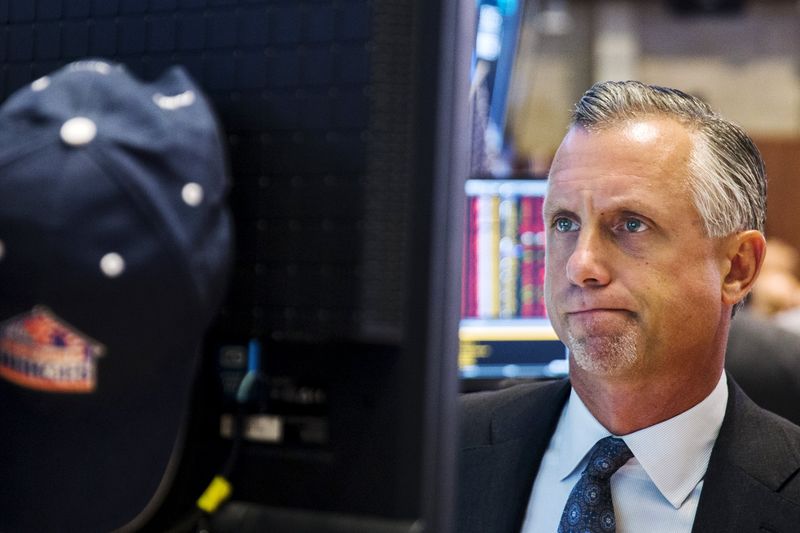Oil prices steady near 1-mth high on US-Iran sanctions; OPEC+ meeting awaited
(Updates throughout)
By David Randall and David Henry
NEW YORK, April 24 (Reuters) - Global equity benchmarks
struggled on Friday as some U.S. states began reopening
businesses despite the disapproval of health experts, and as the
European Union put off addressing details of its new economic
rescue plan.
Safe-haven government bonds edged up while the dollar
slipped, reflecting the market's unsettled direction. Oil's
recovery lost some momentum as the day wore on.
MSCI's All Country World Index .MIWD00000PUS slipped 0.3%
as losses in Europe offset U.S. equity gains. The index is on
pace for its worst weekly performance since March.
Equity markets gave up Thursday's gains after a report that
Gilead Sciences Inc 's GILD.O antiviral drug remdesivir had
failed to help severely ill COVID-19 patients in its first
clinical trial. "Any piece of bad news is likely to rattle the market," said
Tim Ghriskey, chief investment strategist at New York-based
wealth management firm Inverness Counsel. "Investors are keen
for a semblance of hope that they can soon crawl out of their
homes and get on with some form of normal life, even if with
trepidation and fear."
On Wall Street, the Dow Jones Industrial Average .DJI was
flat after Boeing Co BA.N fell more than 6% on a report the
planemaker was planning to cut 787 Dreamliner output by about
half. The S&P 500 .SPX gained 7.11 points, or 0.25%, to
2,804.91 and the Nasdaq Composite .IXIC added 40.27 points, or
0.47%, at 8,535.03.
As the U.S. coronavirus death toll topping 50,000, Georgia
pushed ahead with its plan to become the first state to allow an
array of small businesses to reopen on Friday despite the
disapproval of President Donald Trump and health experts.
EU leaders agreed on Thursday to build a trillion-euro
emergency fund to help recover from the coronavirus outbreak,
while leaving divisive details until the summer. French President Emmanuel Macron said differences continued
between EU governments over whether the fund should be
transferring grant money, or simply making loans.
"The risk exists that a concrete decision on the creation of
the recovery fund may not occur before September, thereby not
being operational before early 2021," Goldman Sachs European
economist Alain Durre wrote in a note.
The pan-European STOXX 600 index .STOXX lost 1.10%.
Investors remained in perceived safe-haven government bonds.
Benchmark 10-year notes US10YT=RR last rose 3/32 in price to
yield 0.6024%, from 0.611% late on Thursday.
The dollar index =USD fell 0.08%, but the euro EUR= rose
0.14% to $1.0791.
The U.S. House of Representatives on Thursday passed a $484
billion bill to expand federal loans to small businesses and
hospitals overwhelmed by patients. Trump, who has indicated he will sign the bill, said late
Thursday he may need to extend social distancing guidelines to
early summer.
Oil prices lost some momentum but broadly retained their
recovery from this week's price collapse which pushed U.S. crude
futures into negative territory for the first time ever,
supported by producers such as Kuwait saying they would move to
cut output. O/R
U.S. crude CLc1 rose 1.82% to $16.80 per barrel at midday,
and Brent LCOc1 was at $21.50, up 0.8%.
<^^^^^^^^^^^^^^^^^^^^^^^^^^^^^^^^^^^^^^^^^^^^^^^^^^^^^^^^^^^
Global assets http://tmsnrt.rs/2jvdmXl
Global currencies vs. dollar http://tmsnrt.rs/2egbfVh
Emerging markets http://tmsnrt.rs/2ihRugV
MSCI All Country Wolrd Index Market Cap http://tmsnrt.rs/2EmTD6j
^^^^^^^^^^^^^^^^^^^^^^^^^^^^^^^^^^^^^^^^^^^^^^^^^^^^^^^^^^^>
